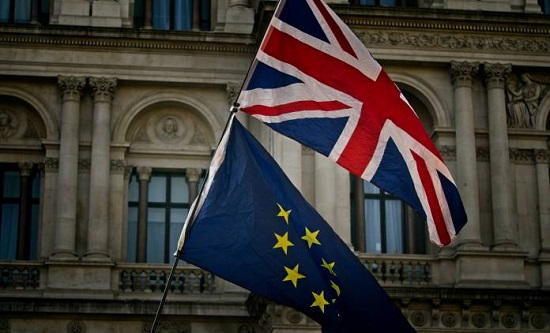
The idea that either the European Union or the United Kingdom wanted to engage in a self-destructive bout of negative exchanges over visible trade (the trade in goods) as a result of the Brexit decision, runs counter to the immediate economic interests of both parties. The smoke and noise emanating from four years of discussions between the two sides, was designed to manage their respective chauvinists, a significant constituency, whose allegiance is important for the governing parties to retain. Nevertheless, competition between capitals tolerates no truce, and both sides of this squabble will seek commercial advantages as soon as the opportunity arises.
The current leadership of an internationally comparatively weaker British imperialism wanted to free itself from any restrictive decision-making imposed from without. It cannot tolerate constraints on its freedom to manoeuvre to accumulate more capital for itself. This means avoiding standards of any sort which obstruct the expansion of its assets. Thus, under the December 2020 UK-EU Trade and Cooperation Agreement, workers’ legal rights and the environment are no longer, practically, subject to the limited protections given by EU treaties.
That Johnson’s odd cabinet of reactionary chancers was singing hymns that did not suit what remains of British manufacturing industry, resulted in huge pressures being piled on the government to sign up to continuity. That financial, legal, audio-visual and other services (80% of UK GDP) were left without agreements, had to be swallowed. In this case, drawing attention to fishing was ideal for all parties. Economically insignificant and with most UK licences – and so the profits – held by foreign holdings, Johnson could steal the Brexiteers’ dead fish stunts for his own purposes. What is ignored is that horrid Tory nightmare, ‘red tape’, which has now been dumped in reams on ‘free’ British citizens, who are certainly no longer ‘free’ to work, study, start a business or reside in the EU (and UK Google users are now ‘free’ too from more robust EU data protection measures, as their accounts move to US jurisdiction). Forgotten are the patriot’s delights, the ‘British Overseas Territories’ (Gibraltar, Falkland Islands/Malvinas, Cayman Islands, Bermuda etc) which now face stiff EU tariff barriers, or the Six County dependency, which doesn’t. With the December deal, the policy portfolio is now reshuffled, but with little practical change to the agreement made by former Prime Minister Theresa May, which Johnson rejected, allowing him to take her place.
Behind all this lies the need for as much continuity as is possible for the moment, so zero tariffs and zero quotas, which, for UK products to be exported to the EU, means that EU inputs and processing will be counted as UK inputs, and vice versa for EU products containing UK content. All this presumes common standards. A Partnership Council and innumerable other committees will struggle to keep things running smoothly. Meanwhile, the critical discussions on services are booted further down the road and out of the limelight. Brexit will now become a long, arduous struggle to define trading conditions for services, essentially financial operations, followed by mutual threats of ‘remedial measures’ and ‘rebalancing’ after ‘consultations’ and ‘arbitration’. Brexit is more like Botch-it. A stronger Franco-German effort will be made to deepen and strengthen the Eurozone’s own financial markets. Johnson’s gamble relies above all on US financial imperialism’s use of its London base, without which the City would decline, and this explains his toadying to Trump and his anxiety over Biden’s comments on Ireland.
The whole purpose of joining the European Economic Community in 1973 was to remove obstructions to trade with the bigger European states, that had by then overtaken the British per capita standard of living, but which offered a huge market for service exports, notably financial services. Such a step was felt to be essential in the economic doldrums of that decade. However, it was only by first changing the rules of the banking game in the 1980’s that London attracted sufficient US, German, Dutch and other bank capital to be able to force open new European Community banking agreements through discussions from 1986 to 1992. Thus, Britain played a leading role in the creation of the EU of 1992, but its ruling class was never ready to yield final powers to an evolving European state.
Since then, British financiers have been able to use their activities within the EU to offset the relative weakening of the competitive capacities of much of Britain’s other industries. Despite this, domestic capital assets were constantly sold off, abroad, on a large scale to balance the country’s international payments. This slowed down the deepening polarisation of income across the population, but it could not prevent it. On the contrary, the bourgeoisie were faced with the fact that their ‘growth’ had to lead to greater numbers of employed workers living in poverty. Now aware that it has reached a critical point in the cannibalisation of domestic assets, and with genuine competition outweighed by global monopoly arrangements, the British ruling class seeks to open any and every door to revive and strengthen its biggest businesses.
To do this, British capitalism must take every opportunity to do deals that no longer need to meet even mediocre EU standards, and to return to an openly opportunistic position of ‘free trade and friendly cooperation’. It is no surprise that EU politicians are alarmed at the likelihood of British business abandoning standards to create cost advantages. Who can question the fact that British business must seek – as Johnson’s foreword to this agreement states – to ‘take full advantage of the freedom of action’ now obtained? There can be no doubt that these changed circumstances are intended to force British capital to fight more aggressively for its existence on the global stage, further despoiling the environment and robbing workers world-wide. One thing is certain, the British and European ruling classes will always stand shoulder to shoulder against the building of genuine socialism in Europe – that has not changed, Brexit or not.
James Martin




